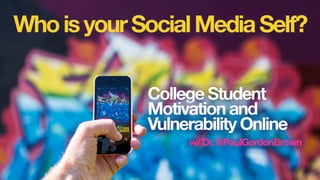
Who is your Social Media Self? College Student Motivation and Vulnerability Online
- 1. WhoisyourSocialMediaSelf? College Student Motivation and Vulnerability Online w/ Dr. @PaulGordonBrown
- 3. GainLossvs
- 4. 89% of adults 18-29 years old use social media 67% access it on mobile 98% of adults ages 18-29 are on the internet 70 70 70 43% 60% 89% 65+ 50-64 30-49 70 78% 18-29 social media use by age younger generations are using the internet, social media, and mobile technologies at a high rate
- 7. 2016 ISTE Standards for Students
- 8. eRezLife
- 12. Question Research How do college students conceptualize who they are and how they present themselves when they are engaged in digital and social media? @paulgordonbrown
- 13. Roger’s Diffusion of Innovation (Rogers, 2003) sample 16 student College students 18-24 years old ‣ Completing/completed coursework in social media (half) ‣ Identified by college staff has heavy/sophisticated users (half) Student Profile ‣ From a highly selective research university on a residential campus near a major metropolitan area in the Northeast Qualitative Study Grounded Theory Method
- 14. Pre-interview Questionnaire ‣ Establish usage patterns of participant Semistructured Interview (First Session, 1 hour) ‣ Probe how students understand self ‣ Examine how sense is made of online/offline life Synchronous Ethnographic Tour * (Second Session, 1 hour) ‣ Observe how students interact online ‣ How is identity constructed/understood Semistructured Interview (First Session, 1 hour) ‣ Probe how students understand self ‣ Examine how sense is made of online/offline life data collection * (Martínez Alemán & Lynk Wartman, 2009, p. 23)
- 15. 1 2Digital Identity or Reputation Digitized Development @paulgordonbrown
- 17. Digital Identity @paulgordonbrown Or more accurately, digital identities, are the personas, data, and actions we take online as well as the reputation of those identities and how they are viewed by others. @paulgordonbrown
- 18. @paulgordonbrown
- 20. FROM THE WOMB! We even have digital stamps @paulgordonbrown
- 22. Your Name What is the first thing that comes up? Is it you? Is it someone else? What do you want to come up?
- 24. We need to educate each other on digital reputation.
- 26. DigitalIdentity/ Reputation vs Digitized Development What We Produce vs What We Are What Other People See vs How We See Ourselves Can Be Taught Through Rules vs Must Be Learned Dynamically A By-Product Of Development vs The Developmental Process Itself
- 27. Digital Identities Digitized DevelopmentOne’s level of sophistication in navigating digitized development impacts how one chooses to present one’s digital identities and how one understands these digital identities in relation to their sense of self. One’s digital identities and the exploration of and action through these identities influences one’s level of sophistication in navigating digitized development (and potentially how one conceptualizes one’s selfhood as digitized). Digital identities are the different representations and personas students take on through different social media platforms and in presentation to different audiences. Digitized development is what occurs when developmental processes, behaviors, and life experiences play out differently as a result of the influence of social and digital technology, their affordances, and the virtual spaces these technologies create. ReciprocalRelationship
- 29. Digitized Development @paulgordonbrown is the underlying developmental processes that inform how we understand ourselves and our behavior in digital spaces. Digitized development can carry unique properties from offline development. @paulgordonbrown
- 31. Student explores and experiments openly with social media. This is strongly influenced by authorities (parents/guardians) through access and peers through peer culture. Student does not understand how online and offline interactions can impact each other or possess a sophisticated understanding of context. Student makes conscious choices about social media usage and how it fits into life desires, outlook, and goals. Student realizes that one’s online life requires constant renegotiation as one’s goals, needs, contexts, and circumstances change. @paulgordonbrown
- 34. “Thatnumberinitself doesn’tmeananything unlessyoucompareitto otherposts.” -Addie @paulgordonbrown
- 44. games playing
- 55. Use of Technology Heavy UsersLight Users Digitized Development High Level SophisticationLow Level Sophistication Digitized Selfhood mulitplistic/relativistic/relationalsingular/unitary Heavy technology usage is necessary but not sufficient for digitized development to emerge. One could be a heavy user of technology and yet not use it in a way that leads towards greater digitization of development. Similar to physical world development, individuals reach towards higher level sophistication in navigating digitized development over time. Digitized selfhood is the extent to which one views digital/virtual spaces as an integral part of one’s being and therefore constructs concepts of self that are more multiplistic, relativistic, and relational as opposed to singular and unitary. Technology Usage, Digitized Development, and Digitized Selfhood ? ?? Digitized selfhood was hypothesized, but only weakly found in this study. Digitized development is what occurs when developmental processes, behaviors, and life experiences play out differently as a result of the influence of social and digital technology, their affordances, and the virtual spaces these technologies create.
- 57. social media can be used for so much MORE
- 58. @paulgordonbrown
- 61. be open to new paradigms of organizing @paulgordonbrown
- 66. Image Credit: REUTERS/Kimimasa Mayama (http://www.businessinsider.com/vatican-square-2005-and-2013-2013-3) 2005ElectionofPopeBenedict
- 67. Image Credit: AP (http://www.businessinsider.com/vatican-square-2005-and-2013-2013-3) 2013ElectionofPopeFrancis
- 68. Social media in student activist movements… Removes and lessens barriers Serves as a tool for organizing and mobilizingAdam Gismondi, Ph.D. @AdamGismondi / @TuftsIDHE Institute for Democracy & Higher Education
- 69. Social media in student activist movements… Serves as a conduit for information dissemination and consumption Creates a “common language” Adam Gismondi, Ph.D. @AdamGismondi / @TuftsIDHE Institute for Democracy & Higher Education
- 70. but it also… Lead to an avoidance of civil debate Adam Gismondi, Ph.D. @AdamGismondi / @TuftsIDHE Institute for Democracy & Higher Education Create an intimidating environment for early-stage development
- 76. be a good partner in learning
